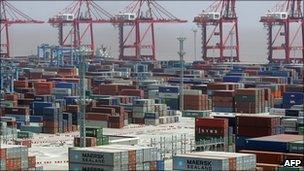List of facilities 'vital to US security' leaked
- Published

Ningbo port in south-eastern China, one of the facilities on the US list
A long list of key facilities around the world that the US describes as vital to its national security has been released by Wikileaks.
In February 2009 the State Department asked all US missions abroad to list all installations whose loss could critically affect US national security.
The list includes pipelines, communication and transport hubs.
Several UK sites are listed, including cable locations, satellite sites and BAE Systems plants.
BBC diplomatic correspondent Jonathan Marcus says this is probably the most controversial document yet from the Wikileaks organisation.
The definition of US national security revealed by the cable, external is broad and all embracing, he says.
There are obvious pieces of strategic infrastructure like communications hubs, gas pipelines and so on. However, other facilities on the list include:
Cobalt mine in Congo
Anti-snake venom factory in Australia
Insulin plant in Denmark
In Britain, the list ranges from Cornwall to Scotland, including key satellite communications sites and the places where trans-Atlantic cables make landfall.
A number of BAE Systems plants involved in joint weapons programmes with the Americans are listed, along with a marine engineering firm in Edinburgh which is said to be "critical" for nuclear powered submarines.
In other cables released by Wikileaks on Sunday:
Australian Foreign Minister Kevin Rudd, while prime minister, allegedly said at a lunch with US Secretary of State Hillary Clinton that the West should be prepared to use force against China "if everything goes wrong"
Qatar is allegedly using the al-Jazeera news network as a bargaining chip, apparently promising Egypt that it would cease the network's transmission there for a year if President Hosni Mubarak agreed to deliver "a lasting settlement for the Palestinians"
Mrs Clinton criticised efforts by Saudi Arabia, Qatar, UAE and Kuwait to combat militants, and said that Saudi donors were the "most significant source of funding to Sunni terrorist groups worldwide"
The alleged mastermind of the 2008 Mumbai attacks, Zaki-ur-Rehman Lakhvi, continued to run militant group Lashkar-e-Taiba, along with the group's founder, Hafiz Saeed, despite being detained over the attacks
'Targets for terror'
The geographical range of the document on installations is extraordinary, our correspondent says.
If the US sees itself as waging a "global war on terror" then this represents a global directory of the key installations and facilities - many of them medical or industrial - that are seen as being of vital importance to Washington.
Some locations are given unique billing. The Nadym gas pipeline junction in western Siberia, for example, is described as "the most critical gas facility in the world".
It is a crucial transit point for Russian gas heading for western Europe.
In some cases, specific pharmaceutical plants or those making blood products are highlighted for their crucial importance to the global supply chain.
The critical question is whether this really is a listing of potential targets that might be of use to a terrorist, our correspondent says.
The cable contains a simple listing. In many cases towns are noted as the location but not actual street addresses, although this is unlikely to stop anyone with access to the internet from locating them.
There are also no details of security measures at any of the listed sites.
What the list might do is to prompt potential attackers to look at a broader range of targets, especially given that the US authorities classify them as being so important.
It is not perhaps a major security breach, but many governments may see it as an unhelpful development, our correspondent says.
It inevitably prompts the question as to exactly what positive benefit Wikileaks was intending in releasing this document, he adds.
Former UK Foreign Secretary Sir Malcolm Rifkind condemned the move.
"This is further evidence that they have been generally irresponsible, bordering on criminal," Sir Malcolm said. "This is the kind of information terrorists are interested in knowing."
But Wikileaks lawyer Mark Stevens denied that Wikileaks was putting people and facilities at risk.
"I don't think there's anything new in that," he told the BBC.
"What I think is new is the fact that it's been published by Wikileaks and of course we have the Wikileaks factor because a number of governments have been embarrassed by what's happened..."